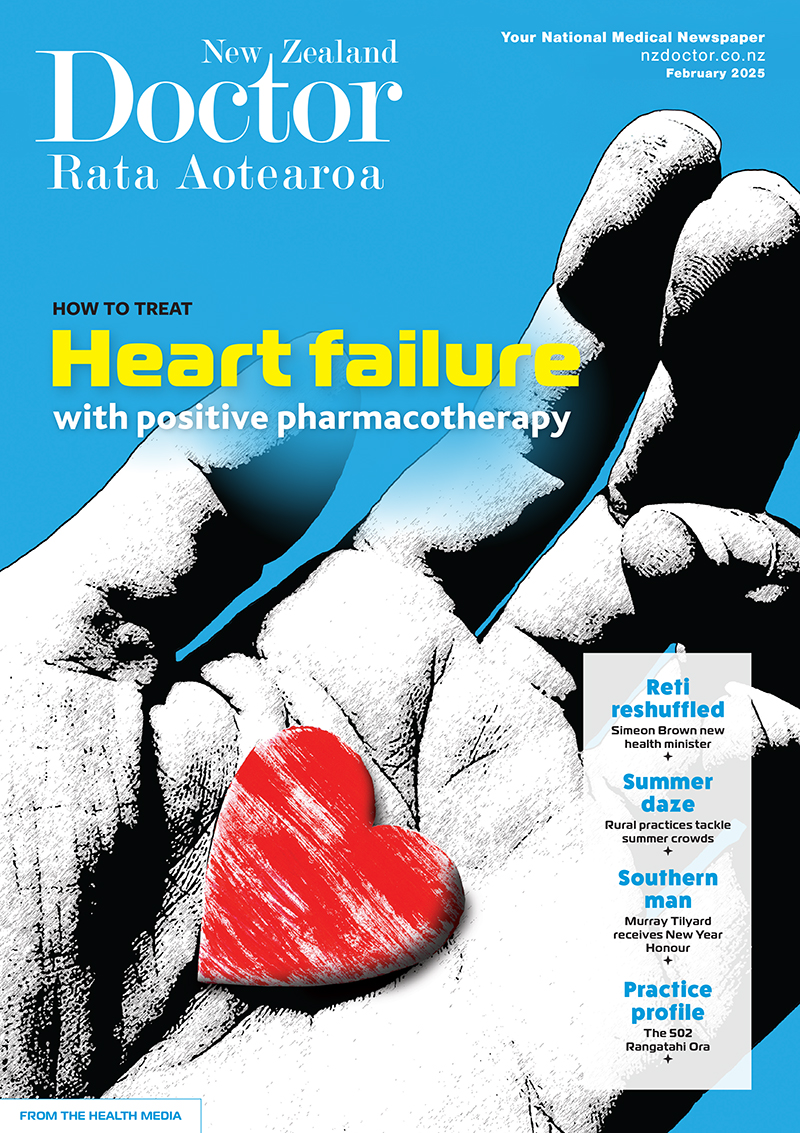Pharmacist prescribers Linda Bryant and Leanne Te Karu discuss positive polypharmacy for heart failure. Current evidence shows the intensive implementation of four medications offers the greatest benefit to most patients with heart failure, with significant reductions in cardiovascular mortality, heart failure hospitalisations and all-cause mortality
Is now the time to consider seriously universal access to primary care?
Is now the time to consider seriously universal access to primary care?

University of Auckland health policy researcher Tim Tenbensel begins a regular column looking at the peculiar and particular of policy
Experience in many countries that did adopt universal funding, such as Canada and Denmark, shows it actually stimulates the bargaining power of organised medicine
A prominent policy scholar, Hugh Heclo, once referred to public policy as a process of “puzzling”. As a society, we collectively determine where to go and how to get there using policy processes. While government plays a central, coordinating role in this “puzzling process”, policy is always co-produced with non-government participants.
Let’s imagine a collection of family members gathered at the bach after Christmas, attempting to solve a jigsaw. One member might assume overall responsibility for the process. The participants may be cooperative or fractious – each will have access to different pieces of the puzzle, and a different level of interest in solving it, each has different experiences of puzzles and each may have different preferred strategies. The process of solving the puzzle reveals ingrained patterns of interaction between family members (both helpful and unhelpful).
One of the biggest puzzles currently facing New Zealand health policy is the funding of primary care. Although there is widespread dissatisfaction with the current VLCA system of targeting, there are clearly very different preferences regarding alternative regimes based on primary care practices, geographic areas or individual patients.
One obvious solution is to abandon targeting altogether. In other words, to extend universal access (ie, no patient copayment) as currently operates for children under 13, to the whole population.
This solution has been adopted in nearly every other high-income country that funds its health system predominantly through taxation, and New Zealand governments first attempted this solution in the 1930s. The current political conditions – a new government committed to reviewing primary care funding and boosting funding for the health sector – provide an ideal opportunity for seriously considering universal access afresh.
Universal access would remove the anomaly of a copayment in primary care but no charge for hospital care, and the perverse incentives this creates. It addresses the most obvious way of lifting our health system’s performance shortcomings, namely access to services and equity.
The most common objections to universalism is that it wastes valuable public funding on the relatively well-off who can afford copayments, and stimulates “unnecessary” demand. Targeted systems, by contrast, supposedly direct funding more effectively to those in greatest need.
However, effective targeting also costs money, particularly to support the systems necessary to determine and administer eligibility, for example, the Community Services Card.
When the Auckland Regional After-Hours Network introduced a targeted approach for reducing after-hours copayments in 2011 based on age, socioeconomic deprivation and high health needs, five out of eight patient visits were eligible for reduced fees. Once the costs of effectively administering a targeted system are factored in, the difference in cost (and efficiency) between targeted and universal systems may be minimal.
Certainly, universalism does increase “unnecessary demand” just as it helps address unmet need (necessary demand). Unfortunately, no jurisdiction has ever designed a funding system that fairly and effectively distinguishes between necessary and unnecessary demand.
A specific New Zealand objection to universal access is that it restricts the autonomy of GPs, and exposes their businesses to significant risk and reliance on government funding to keep pace with the real costs of providing primary care. This was the basis of the successful opposition to universal access from the British Medical Association’s New Zealand branch in the late 1930s.
However, experience in many countries that did adopt universal funding, such as Canada and Denmark, shows it actually stimulates the bargaining power of organised medicine. This is because regular, institutionalised negotiations around the level of funding become an important venue for developing other elements of primary care policy. To be sure, this was an unanticipated consequence of universalism for governments, and may be a reason to be wary of it in New Zealand.
The biggest obstacle to the universal solution, in the short to medium term, is primary care workforce capacity. Addressing the cost barrier to access would likely create other barriers, for example, increased waiting times. However, this does not preclude universal access as a longer-term policy objective. Indeed, one could read developments of the past 20 years as the story of slow, incremental progress towards universal primary care.
Perhaps there is no better time than now to take some bigger steps in that direction. If so, it will be an interesting test of the puzzle-solving smarts, and the state of relationships of New Zealand’s primary care policy family.
Tim Tenbensel is head of the health systems group at the University of Auckland
We've published this article as a FREE READ so it can be read and shared more widely. Please think about supporting us and our journalism – subscribe here



